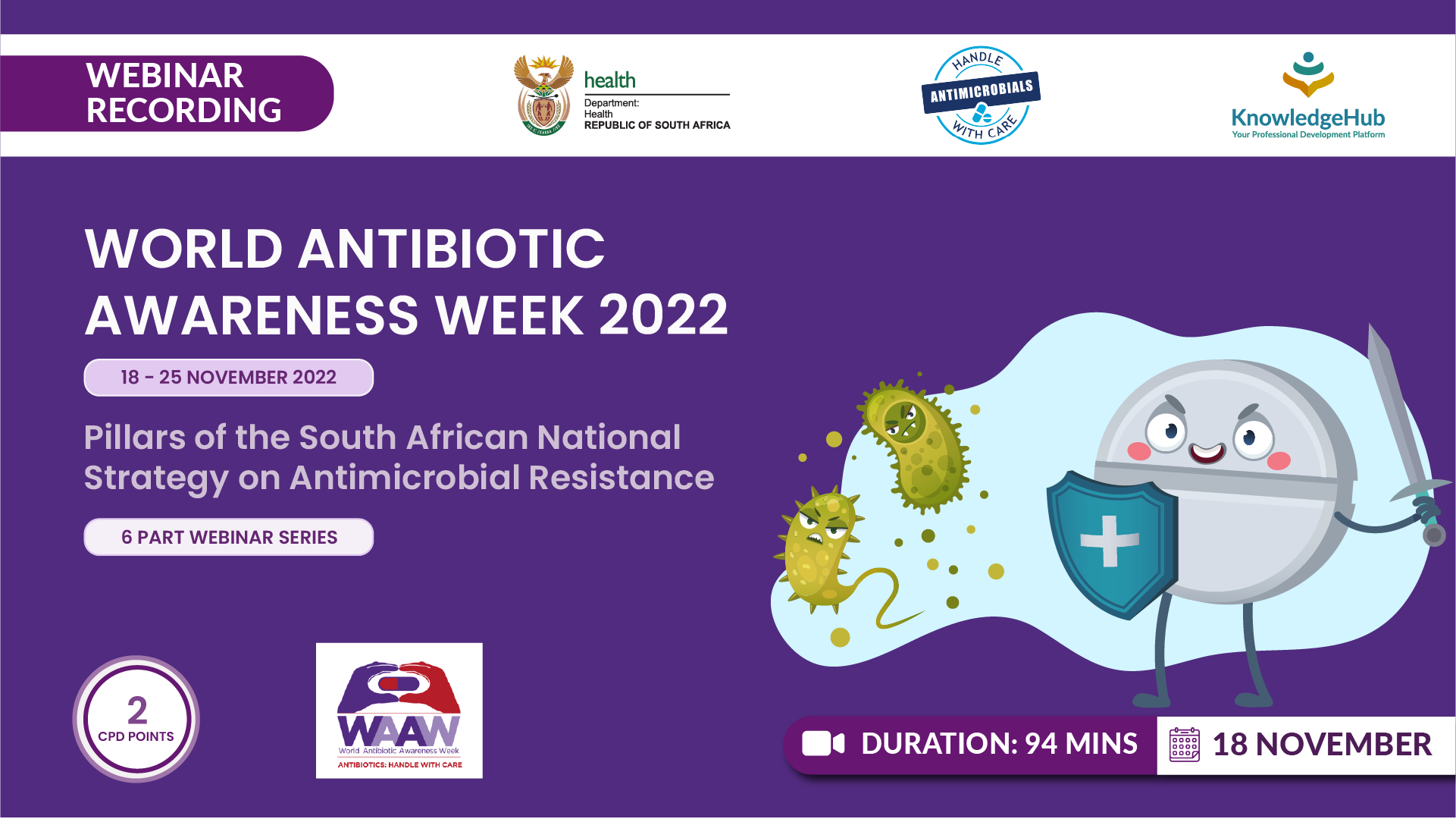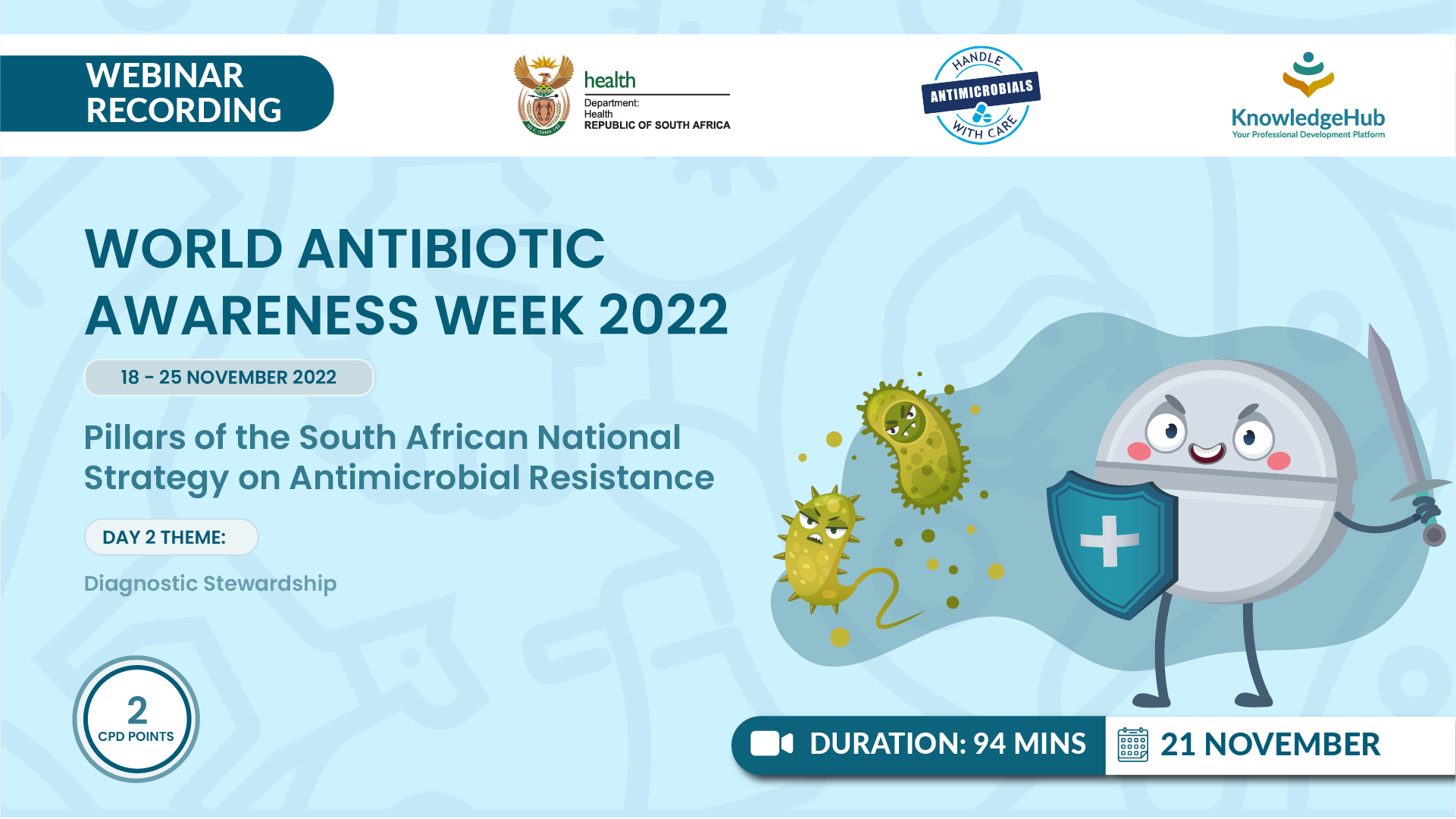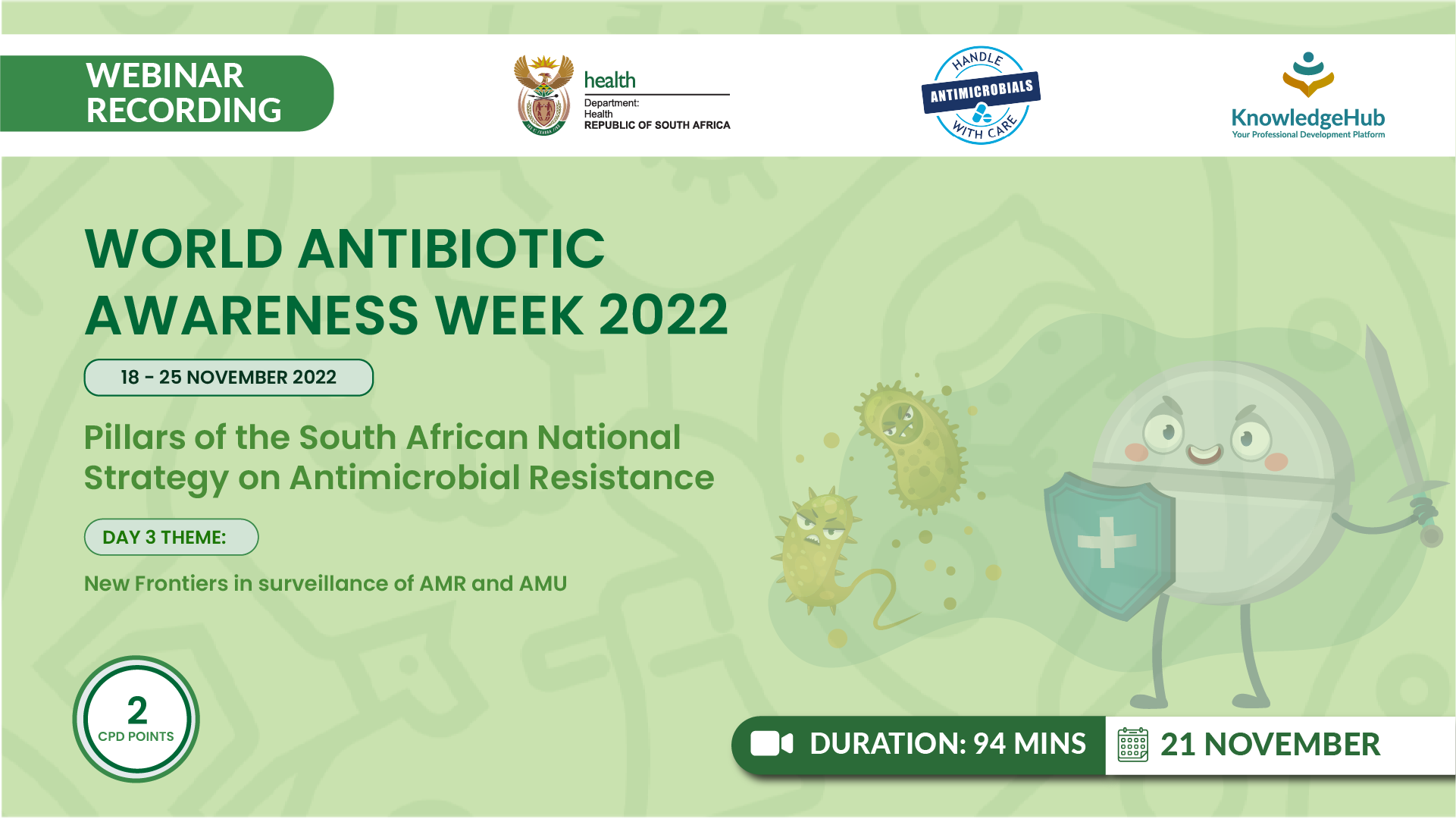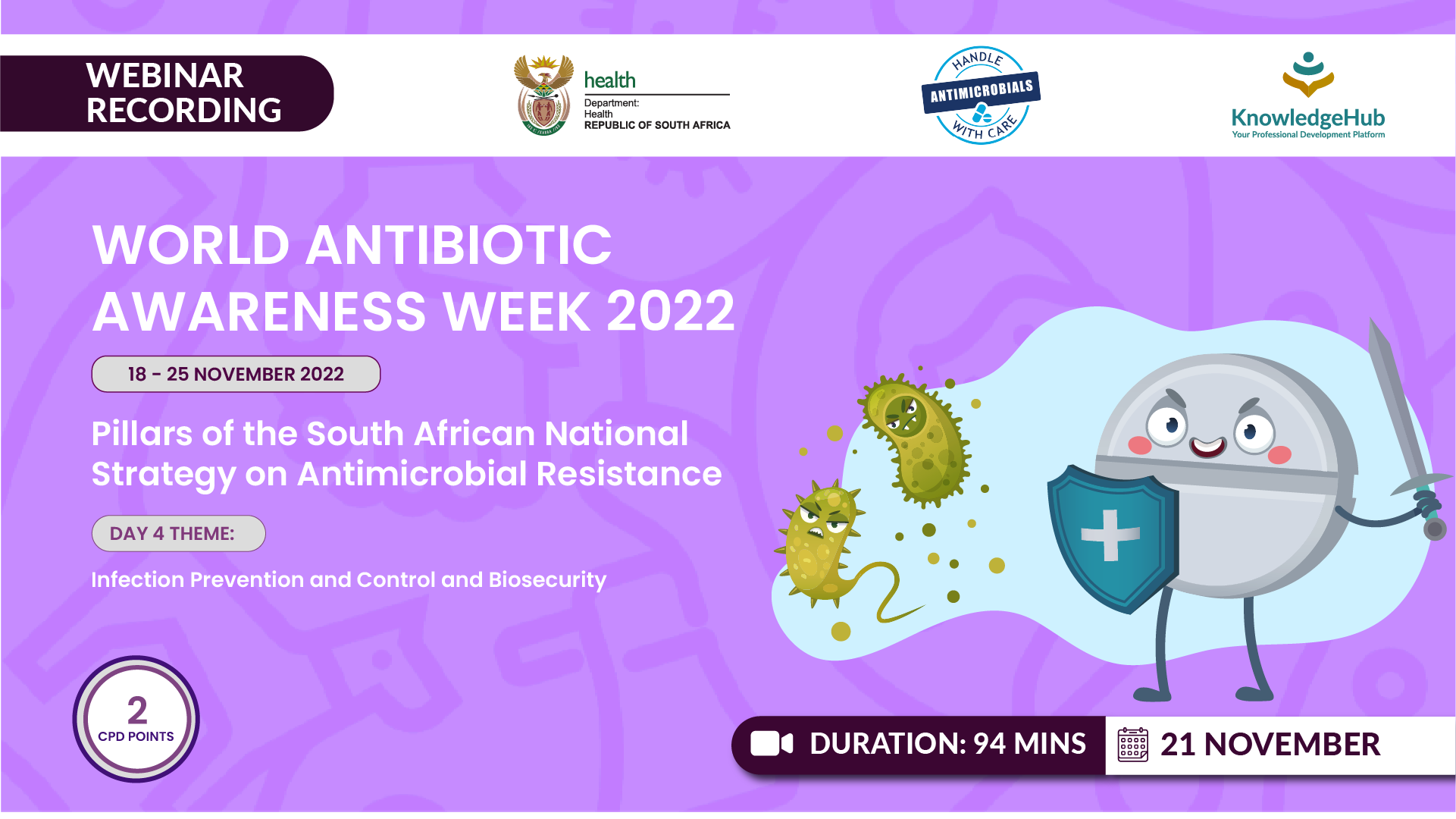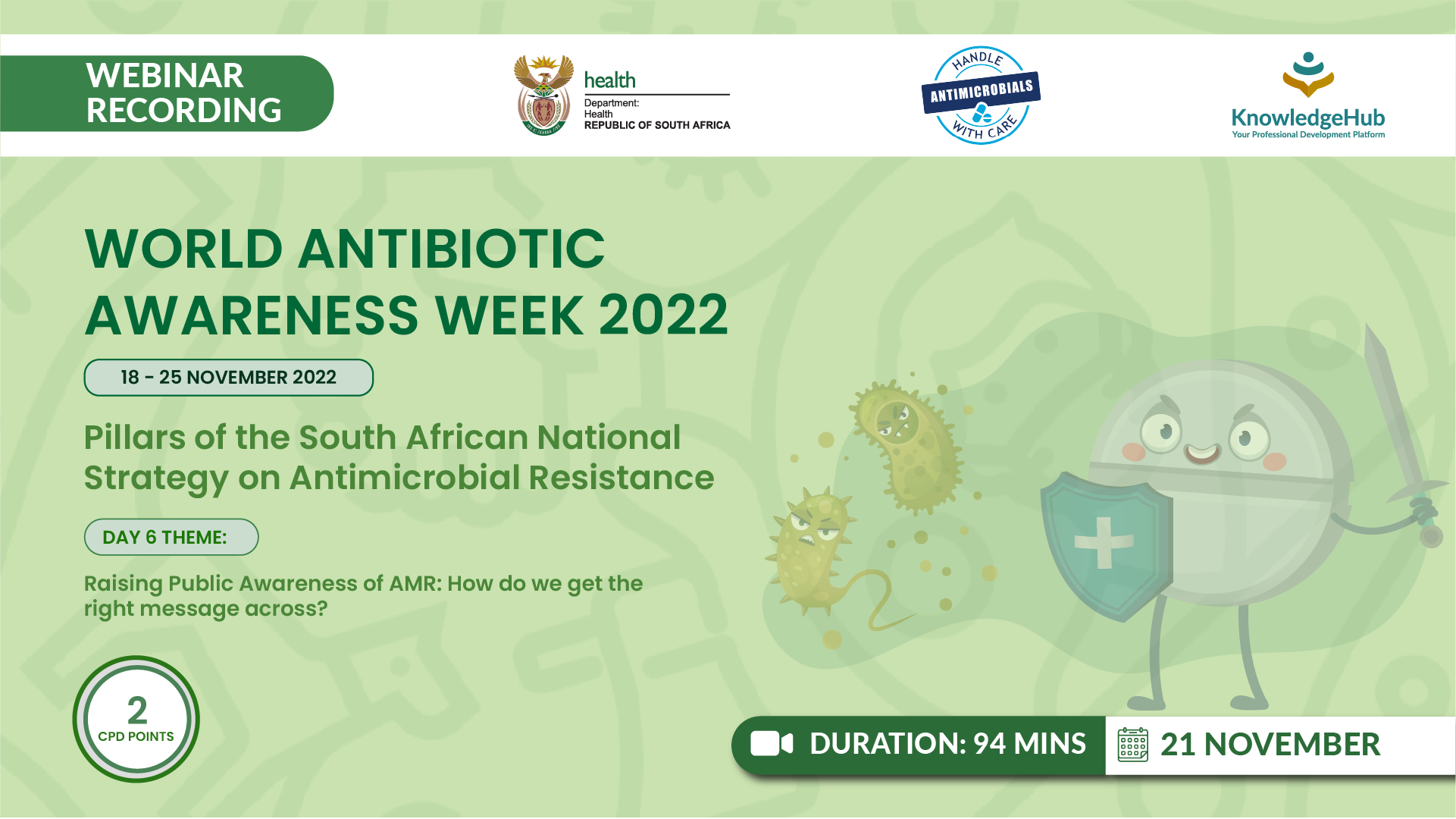World Antibiotic Awareness Week 2022
Theme: The Pillars of the South African National Strategy on Antimicrobial Resistance
Aim: To increase awareness of AMR and to encourage best practices amongst healthcare workers to avoid further emergence and spread of drug resistance infections.
Recording and presentations
- Download the webinar recording.
- Opening remarks by Dr Sandile Buthelezi, Director General (DG) - National Department of Health (NDOH).
- State of the Nation by Professor Marc Mendelson Head of Division of Infectious Diseases and HIV Medicine - Groote Schuur Hospital and UCT.
- AMR and Food Safety in South Africa by Professor Nenene Qekwana, Associated Professor/HOD - University of Pretoria.
- AMR and the Environment: Rubbish In, Resistance Out by Professor Liza Korsten, Co-Director DSI/NRF Centre of Excellence Food Security - University of Pretoria.
Recording and presentations
- Download the webinar recording.
- Appropriate use of microbiological diagnostics to guide therapeutic decisions, by Dr Birgitta Gleeson, Scientist AMR - FIND the global alliance for diagnostics.
- The diagnostic pipeline for infection management in human health by Mr Kavi Ramjeet, Head of Business Intelligence - FIND the global alliance for diagnostics.
- Optimising the use of diagnostics for AMR in animal health by Dr Annelise Jonker, Senior Lecturer - University of Pretoria (UP).
Recording and presentations
- Download the webinar recording.
- Antimicrobial resistance and relatedness of bacterial organisms obtained from feed farm and human contacts by Associate Professor Olga Perovic, Principal Pathologist - National Institute for Communicable Diseases a division of NHLS.
- The AWaRe index for human health: how should it be used and what should our targets be? by Mrs Phumzile Skosana, Lecturer - Sefako Makgatho Health Sciences University.
- An Antimicrobial Categorisation System for Animal Health: As Easy as ABCD by Dr Catriona Lyle, Equine Internal Medicine Specialist - Vetscape Animal Hospital.
- Adapting wastewater surveillance for SARS-CoV-2 to AMR by Dr Sabelle Jallow, Principal Medical Scientist, National Institute for Communicable Diseases.
Recording and presentations
- Download the webinar recording.
- Applying an annual national point prevalence survey to monitor HAI infections in South Africa: An affordable option by Professor Shaheen Mehtar, Infection Prevention and Control (retd).
- From Farm to Fork: How do we reduce the need for antibiotics in food production? by Professor Moritz Van Vuuren, Professa Emeritus - Ministerial Advisory Committee on AMR.
- AMR and One Health - is there a connection? by Dr Chris Van Djik, Bovine Herd Health Specialist, Dr Chris Van Djik, Veterinary Specialist (Pty) Ltd.
Recording and presentations
- Download the webinar recording.
- Harmonising guidelines for prescribing in South Africa: WHO antibiotic book and EML by Dr Gary Reubenson, Head: Clinical Unit - Rahima Moosa Mother & Child Hospital and University of Witwatersrand.
- Stewardship of reserve antibiotics in South Africa by Professor Adrian Brink, HOD Medical Microbiology - University of Cape Town.
- Antimicrobial Stewardship: Be Aware of the dog by Dr Catriona Lyle, Equine Internal Medicine Specialist - Vetscape Animal Hospital.
Recording and presentations
- Download the webinar recording.
- The use of imagery in AMR: What's gone wrong? by Dr Esmita Charani, Reader in AMR - Liverpool University and Global Health - University of Cape Town.
- Involving patients in IPC: A captive audience with skin in the game by Ms Oluchi Mbamalu, Pharmacist (Research) - University of Cape Town.
- How do we build a public-centric civil society for AMR in South Africa by Dr Mirfin Mpundu
- Why aren't health journalists more interested in AMR? by Ms Mia Malan, Editor-in-Chief/Executive Director - Bhekisisa Centre for Health Journalism.
AMR Course
To enrol/register for the AMR Awareness Module, please use the link below. You are required to register and complete the course requirements to receive a certificate.
This module was created to be broad enough to be accessible to all healthcare workers (HCWs) who deal with human patients or animals (either companion animals or livestock), at any level of care, including public and private sectors. More advanced training modules are being planned, aimed at healthcare workers who show an interest in becoming more actively involved in antimicrobial stewardship.



